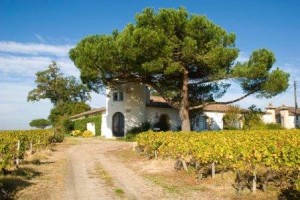
Learn everything about Chateau Lamothe Despujols Sauternes, Deuxiemes Crus with wine tasting notes, wine-food pairings tips, a history of the property, information on the vineyards, and winemaking. If you want to read about other important, Bordeaux Chateaux: Links to all Bordeaux Wine Producer Profiles
Chateau Lamothe Despujols History, Overview
Lamothe Despujols is one of the older wine-producing estates in the Sauternes appellation. In fact, it can be dated back several centuries. The oldest buildings on the property were constructed all the way back in the 16th century.
The property was once part of a much larger estate Lamothe estate, which gave birth to multiple estates including; Chateau Lamothe Guignard, Chateau Lamothe Berget, and of course Chateau Lamothe Despujols.
The Lamothe family founded the chateau, which is where the first part of the name comes from. Centuries later, in 1961, the Despujols family took over the property. Following the previous custom in Bordeaux when owners added their name to the estate, the chateau from that point forward became known as Chateau Lamothe Despujols.
Chateau Lamothe Despujols Vineyards, Terroir, Grapes, Winemaking
The 7.48-hectare vineyard of Chateau Lamothe Despujols in Sauternes is planted to 85% Semillon, 10% Sauvignon Blanc and 5% Muscadelle. The terroir is a mix of limestone, sand, gravel, and clay soils, on a plateau, with southwest exposures. The vines are on average 40 years of age. But the vineyards of Chateau Lamothe Despujols also have old vines. Some of their oldest vines are more than 70 years of age.
To produce the wine of Chateau Lamothe Despujols, after the grapes are pneumatically pressed, vinification takes place in vat. The wine is aged in a combination of tank and 25% new, French oak barrels.
The best vintages of Chateau Lamothe Despujols are: 2023, 2022, 2021, 2020, 2019, 2018, 2017, 2016, 2015, 2014, 2013, 2011, 2010, 2009, 2007, 2005 and 2001.
There is a second wine, Les Tourelles de Lamothe. Production of the Sauternes wine from Chateau Lamothe Despujols is on average 1,000 cases of Sauternes wine per year.
When to Drink Chateau Lamothe Despujols, Anticipated Maturity, Decanting Time
Chateau Lamothe Despujols can be enjoyed on the young side with no decanting. In fact, it is delicious and quite a treat young, even on release! However, Chateau Lamothe Despujols is better with age and does not reach full maturity until it’s between 9-20 years of age, or in some years, perhaps even longer in the best vintages! With Chateau Lamothe Despujols, and frankly, all Sauternes, the temperature is more important than decanting.
Serving Chateau Lamothe Despujols with Wine and Food Pairings
Chateau Lamothe Despujols is best served at 14 degrees Celsius, 57 degrees Fahrenheit. The cool, almost cellar temperature gives the wine more freshness and lift. The wine will naturally warm in the glass, while it develops more aromatic complexities and fleshes out.
Chateau Lamothe Despujols can be served with seafood dishes, especially shellfish, lobster, crab, and oysters on the half shell. Foie gras is a perfect pairing with its natural sweet, salty and savory characteristics. Chateau Lamothe Despujols can also be paired with roasted chicken, veal, and pork dishes that are either spicy or prepared with a touch of sweetness.
Spicy Asian cuisine, raw fish, like sushi or sashimi, and cheese, both hard and soft also make great pairings with Chateau Lamothe Despujols.
Château Lamothe Despujols Wine Tasting Notes
4 Vintages 6,320 Views Sort by Vintage-Rating
|
2015
Château Lamothe Despujols (Sauternes)
A lighter styled sweet wine that is best served chilled as an aperitif. It can also work well with spicy or savory courses as the level of sweetness is not all that high. Instead, here you find light orange tropical fruits and citrus with a bit of honey and a bright finish. 1,483 Views Tasted Sep 21, 2020 |
|
2013
Château Lamothe Despujols (Sauternes)
Lighter-styled, forward, sweet wine that works equally well as a chilled aperitif already shows off its honeyed, orange, mango, yellow peach and pineapple, honeyed character easily. 1,537 Views Tasted Aug 26, 2021 |
|
2010
Château Lamothe Despujols (Sauternes)
Well priced, medium bodied, lighter style of Sauternes that can pair well with food. There is a nice, honeyed lemon peel character with floral and spice notes. Drink this young and chilled. 1,636 Views Tasted Aug 7, 2014 |
|
2009
Château Lamothe Despujols (Sauternes)
Medium full bodied, without a lot of intensity, but good balance between sweet, ripe, honeyed fruits and acidity. The wine is on the orange, apricot and tangerine side of the spectrum with a honeyed, apricot finish. This is a nice, reasonably priced, early drinking Sauternes. 1,664 Views Tasted May 17, 2017 |

